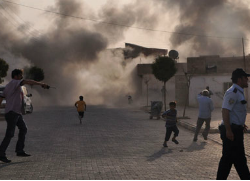
The Syrian crisis is a hot topic in the U.S. Presidential election. Republican candidate Mitt Romney has criticized President Barack Obama’s policies in Syria and suggested that the United States should take a tougher stance on ensuring rebels receive the assistance they need. So far, the Obama administration has limited its assistance to “non-lethal support,” such as providing communications equipment. Amidst growing fears that the Syrian government’s crackdown on rebels may spark a regional war between Syria and Turkey, questions are rife in the U.S. political sector as to what role the United States should take in this conflict.
On Wednesday, October 3, the Syrian government shelled Akcakale, a Turkish town on the border of Syria and Turkey, resulting in five deaths. The victims were all civilian women and children. Turkey retaliated for two consecutive days, shelling a Syrian military position, and authorizing its troops to move beyond its borders. The U.N. Security Council condemned Syria for the attack, and urged both countries to exercise restraint. The Council President, Gert Rosenthal, the ambassador from Guatemala, stated “the members of the council demanded that such violations of international law stop immediately and are not repeated.” The relationship between Turkey and Syria began deteriorating when Syrian President Bashar al-Assad began cracking down on Syrian protestors, which sparked an 18-month civil war between the government and rebels fighting to oust the Syrian President. Syria’s ambassador to the United Nations stated that Syria does not seek to fight with Turkey, however, the ambassador called on Turkey to cease allowing armed Syrian rebels to cross the border, as well as to cease allowing media coverage for opposition groups operating from Turkey.
Syria has not confirmed whether the incident in Turkey was a mistake or intentional, but one possible motive behind the shootings is that rebels have allegedly been using Turkey as a safe haven to regroup and rearm. The rebels are “severely outmatched” and are improvising weaponry, such as taking guns off of Syrian tanks that they have commandeered and mounting them on civilian automobiles. The increase in improvised weapons is an indication that, without outside assistance, the rebels may be unable to maintain adequate weapons and ammunition.
The Syrian government, on the other hand, has continued to receive arms shipments from Russia, despite calls to from Secretary of State Hillary Clinton and many others in the international community to stop the shipments. However, the Russian state-controlled arms dealer, Rosoboronexport, stated, “No one can ever accuse Russia of violating the rules of armaments trade set by the international community.” The dealer further stated that while it continues to supply Syria with mobile gun and missile air defense systems, the contract was signed “long ago,” and the armaments that it supplies to Syria are defensive arms, not attack weapons.
Additionally, Syria continues to receive small arms, infantry weapons, and personnel from Iran, using Iraqi airspace. In a televised interview between al-Assad and Iran’s intelligence chief, Saeed Jalili, Jalili stated that the situation in Syria “is not an internal issue but a conflict between the axis of resistance on one hand and regional and global enemies of this axis on the other.” During the same interview, al-Assad stated that it was “unacceptable” that some countries were “supporting terrorism” by arming the rebels in Syria.
If the United States does take a tougher stance on Syria and ensures that the rebels are armed, the implications could be far-reaching. Iran could interpret U.S. assistance in arming the rebels as U.S. assistance in backing terrorism in Syria, thereby inviting terrorism in return. Additionally, the possibility still exists that the United States, in arming Syrian rebels, may be arming those who may be terrorists in the future, as happened in Afghanistan. Given the candidates’ differing stances, the result of upcoming U.S. Presidential election may alter the fate of Syria and the region.
Lisa Browning is a 2LE at the University of Denver School of Law and a Staff Editor of the Denver Journal of International Law and Policy


